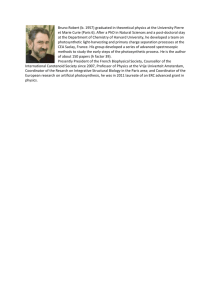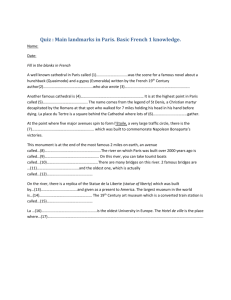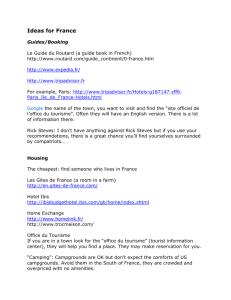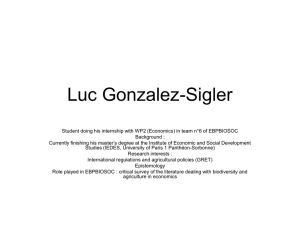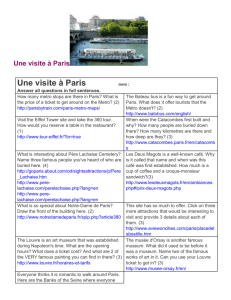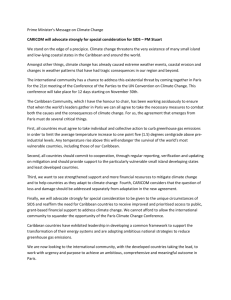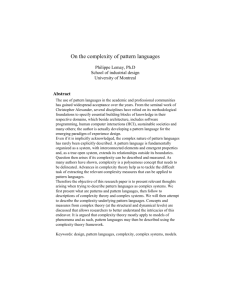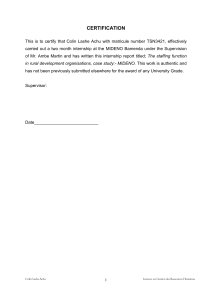2MAN105
advertisement
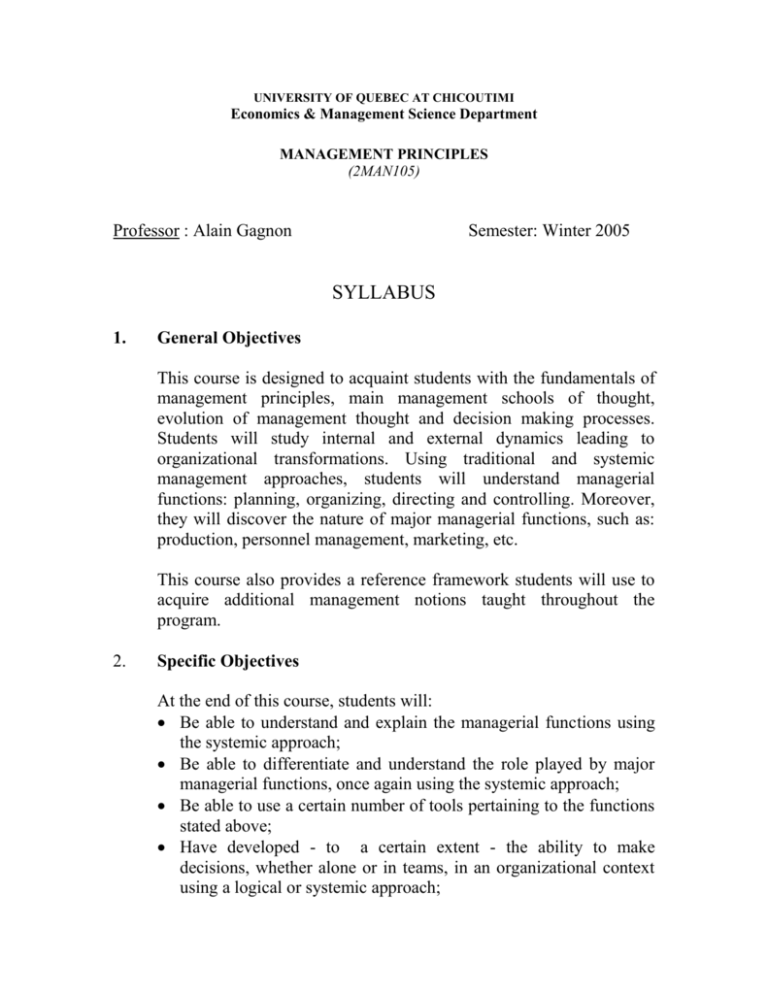
UNIVERSITY OF QUEBEC AT CHICOUTIMI Economics & Management Science Department MANAGEMENT PRINCIPLES (2MAN105) Professor : Alain Gagnon Semester: Winter 2005 SYLLABUS 1. General Objectives This course is designed to acquaint students with the fundamentals of management principles, main management schools of thought, evolution of management thought and decision making processes. Students will study internal and external dynamics leading to organizational transformations. Using traditional and systemic management approaches, students will understand managerial functions: planning, organizing, directing and controlling. Moreover, they will discover the nature of major managerial functions, such as: production, personnel management, marketing, etc. This course also provides a reference framework students will use to acquire additional management notions taught throughout the program. 2. Specific Objectives At the end of this course, students will: Be able to understand and explain the managerial functions using the systemic approach; Be able to differentiate and understand the role played by major managerial functions, once again using the systemic approach; Be able to use a certain number of tools pertaining to the functions stated above; Have developed - to a certain extent - the ability to make decisions, whether alone or in teams, in an organizational context using a logical or systemic approach; Have acquired a solid understanding of the challenges present-day organizations have to face. 3. Teaching Strategies Obligatory readings will precede topics emerging in class. Pierre-G. Bergeron’s La gestion dynamique: concepts, méthodes et applications, Boucherville, published by Gaétan Morin Éditeur, 2001, 3 rd Edition, will be the obligatory volume for the course. Moreover, this syllabus gives the address to a Web site where students will find further readings. The information in these readings and the exercises and case studies done in class will also be part of exam material. 4. Course Outline Part – I Organizations, Management, Managers and Decision Making Organizations: Classic and Systemic Management 0. Managers and management 1. Management thought: evolution and current challenges 2. Decision making 3. The organization and its environment 4. Social responsibility of businesses and ethics Part – II Planning Management Planning Process 5. Strategic planning 6. Planning tools Part – III Organizing Organizations and Organizational Structures Part - IV Directing (leadership) Personnel Management 7. Motivating Staff Part - V Controlling Controlling Process 16. Control tools 5. Grading & Evaluation Mid-term exam (includes theory seen in class, exercises and further readings): February 24: 30%. Term assignment (to be turned in on final exam day: 30% (Be sure to read and understand the directions in the appendix very well). Final exam (includes theory seen in class, exercises and further readings): April 28: 40%. Students absent on exam days or for any other type of evaluation will automatically receive the mark “0”. Assignments or work turned in late will incur a 10% penalty per day. Assignments must be done in teams (minimum and maximum number of members allowed on each team is stated in the appendix). Any assignments not respecting this requirement will not be corrected, unless the students have obtained the professor’s written consent allowing them to do otherwise. Appendix TERM ASSIGNMENT 1. Form In teams of 3 to 5 people; 15-page text (minimum) with numbered pages must be turned in; Text must be typed and 1½ spaced; Detailed table of contents (outline); Titles and subtitles must be used to identify each section and subsection of the text (follow directions given below); Write full pages, not pages that are partially filled in, no grocery lists. Diagrams, illustrations, appendixes, table of contents, title pages do not count as part of the text. Organization charts, pictures and other illustrations must be included in the appendix. 2. Content Description of an organization, its operations and its problem situations; More precisely, students must find an organization and describe the following elements: its mission statement, a detailed organization chart, corporate culture; inputs, procedures and outputs; internal and external environments (strengths and weaknesses), dangers and opportunities; its main competitors; remuneration and staff motivation techniques; main processes and any other pertinent elements. 3. Evaluation 30 points – Distribution 20 points: exhaustiveness of research, precision of the description and usage of theory taught in class. 10 points: Coherence vs. the outline and general quality of the text. 6. References AKTOUF, O., Le management: entre tradition et renouvellement, Boucherville, Gaétan Morin, 1989. BAGLA-GÖKALP,L., Sociologie des organisations, Paris, Éditions de la Découverte, 1998. BEAUJOLIN, F., Vers une organisation apprenante, RueilMalmaison, Liaisons, 2001. BEAULIEU, J.-P., et al., Mobiliser l’organisation face à son avenir: la démarche prospective, Montreal, G. Morin, 2000. BÉDARD, M.G. AND MILLER, R., La direction des entreprises: une approche systémique, conceptuelle et stratégique, Montreal, Chenelière/McGraw-Hill, 2003. BLAIS, R., Les ressources humaines: l’atout concurrentiel, Cap Rouge, Presses interuniversitaires, 1996. BOUQUIN, H., Le contrôle en gestion, Paris, P.U.F., 2001. BRUNO, H., DRH, c’est déjà demain, Paris, Éditions Liaisons, 2002. CLAUDE, J.-F., L’éthique au service du management, Paris, Éditions Liaisons, 2002. CÔTÉ, M. and MALO, M.-C., La gestion stratégique: une approche fondamentale, Boucherville, Gaétan Morin, 2002. DENIS, H., Comprendre et gérer les risques sociotechnologiques majeurs, Montréal, Éditions de l’École polytechnique de Montréal, 1998. DESSLER, G. et al., Gestion des organisations: principes et tendances au XXIe siècle, Montreal, Éditions du Renouveau Pédagogique, 2004. DIRIDOLLOU, B., L’encadrement de proximité, Paris, Éditions d’Organisation, 1995. DRUCKER, P.F., Structures de changements, Montreal, Transcontinental, 1996. DURAND, D., La systémique, Paris, P.U.F., 1979 (“Que sais-je?” 1795). GERVAIS, M., Stratégie de l’entreprise, Paris, Éditions Economica, 2003. HELFER, J.-P. et al., Management: stratégie et organisation, 4th Edition, Paris, Vuibert, 2002. HERSEY, P., Le leader situationnel, Montreal, Actualisation, 1995. PERETTI, J.-M., Ressources humaines et gestion des personnes, Paris, Vuibert, 2001. PLANE, J.-M., Management des organisations: théories, conceptes, cas, Paris, Dunod, 2003. POUGET, M., Taylor et le taylorisme, Paris, P.U.F., 1998. ROEBUCK, C., Déléguez efficacement, Paris, Éditions First, 1999. RONDEAU, A., Changement organisationnel, Cap Rouge, Presses interuniversitaires, 1998. TREMBLAY, D.-G., La gestion des ressources humaines: typologie et comparaisons internationales, Sainte-Foy, Télé-université, 1998. TREVINO, L.K. et al., Managing Ethics in Organizations, Stanford, Calif., Stanford Business Books, 2003.
